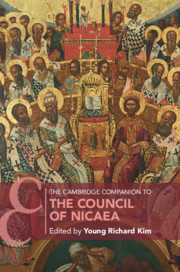Book contents
- The Cambridge Companion to the Council of Nicaea
- Cambridge Companions to Religion
- The Cambridge Companion to the Council of Nicaea
- Copyright page
- Dedication
- Contents
- Figures
- Contributors
- Acknowledgements
- Abbreviations
- 1 Introduction
- Part I Contexts
- Part II The Council
- Part III Outcomes
- Part IV The Aftermath
- Part V The Long Reception
- 15 The Legacy of the Council of Nicaea in the Orthodox Tradition
- 16 Catholic Reception of the Council of Nicaea
- Appendices
- Bibliography
- Index
- References
16 - Catholic Reception of the Council of Nicaea
from Part V - The Long Reception
Published online by Cambridge University Press: 17 December 2020
- The Cambridge Companion to the Council of Nicaea
- Cambridge Companions to Religion
- The Cambridge Companion to the Council of Nicaea
- Copyright page
- Dedication
- Contents
- Figures
- Contributors
- Acknowledgements
- Abbreviations
- 1 Introduction
- Part I Contexts
- Part II The Council
- Part III Outcomes
- Part IV The Aftermath
- Part V The Long Reception
- 15 The Legacy of the Council of Nicaea in the Orthodox Tradition
- 16 Catholic Reception of the Council of Nicaea
- Appendices
- Bibliography
- Index
- References
Summary
This chapter examines the western reception of the creed and canons of the 325 Council of Nicaea. The Nicene–Constantinopolitan Creed appeared in the eucharistic liturgy towards the end of the sixth century, controversially with the insertion of filioque possibly at the Third Synod of Toledo in 589, although the creed was not used in Rome until 1014 under Benedict VIII, despite efforts by Charlemagne with Leo III early in the ninth century. The theological dispute over filioque resulted in the schism between East and West in 1054. The reception of the twenty canons of Nicaea as disciplinary law can be traced through letters of Roman bishops from the end of the fourth century onwards preserved mainly in what would become known as decretal collections. In the middle of the fourth century in Rome the canons from the 343 Synod of Serdica were conflated with the canons from Nicaea and early in the fifth century under Zosimus they were significant in the dispute between Rome and Carthage over questions of Rome’s authority. The questions examined are the degree to which the Catholic Church has considered the canons from Nicaea to be infallible and their status today.
Keywords
- Type
- Chapter
- Information
- The Cambridge Companion to the Council of Nicaea , pp. 347 - 367Publisher: Cambridge University PressPrint publication year: 2021
References
Select References
- 1
- Cited by

